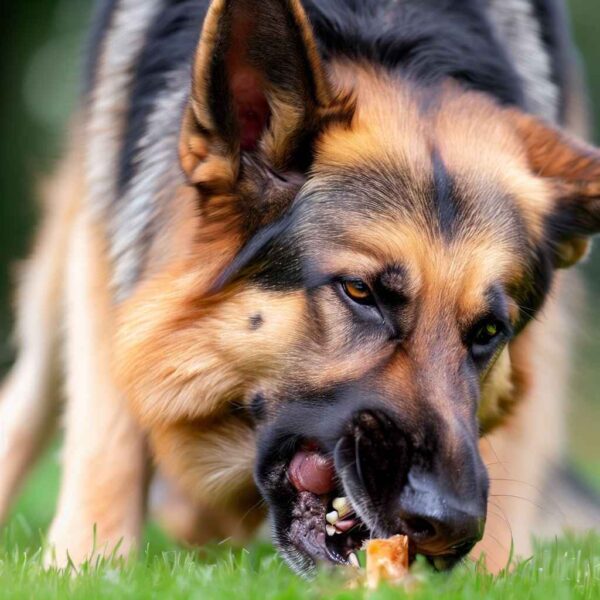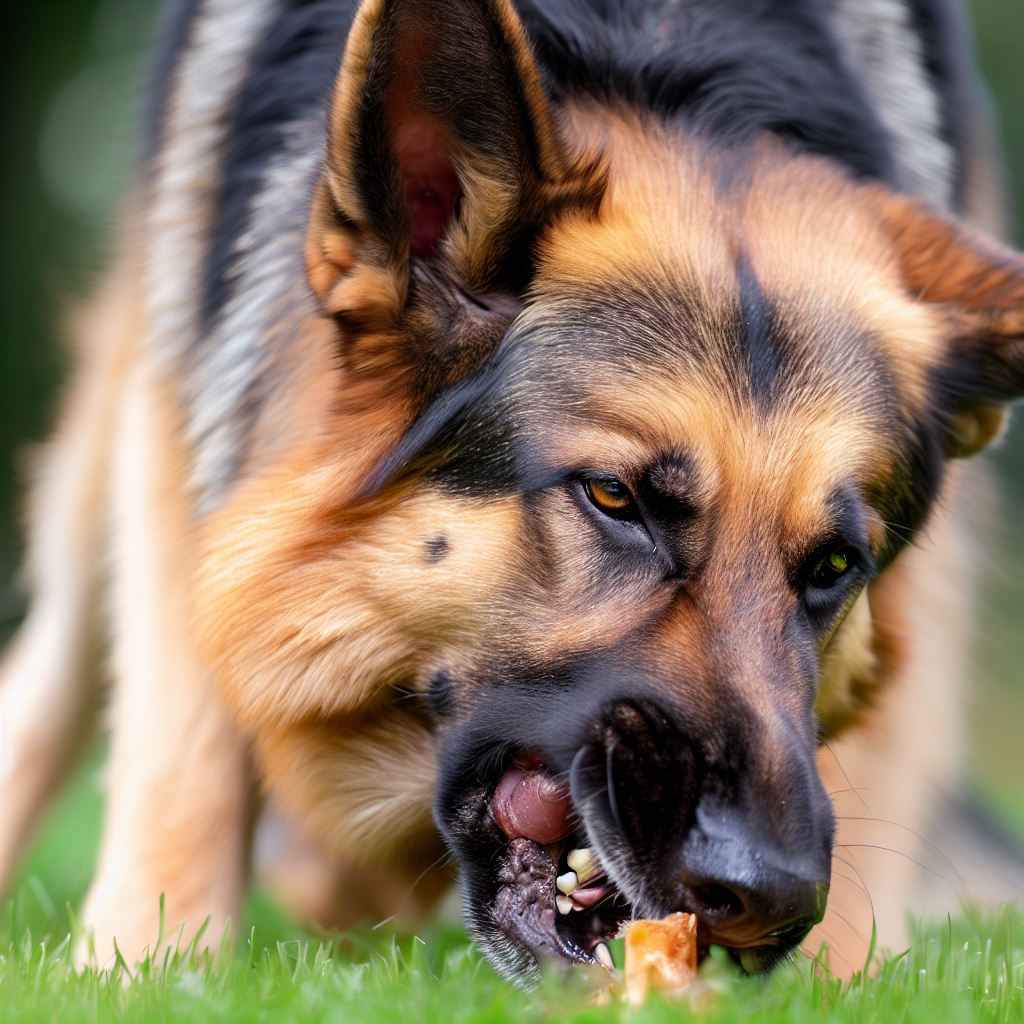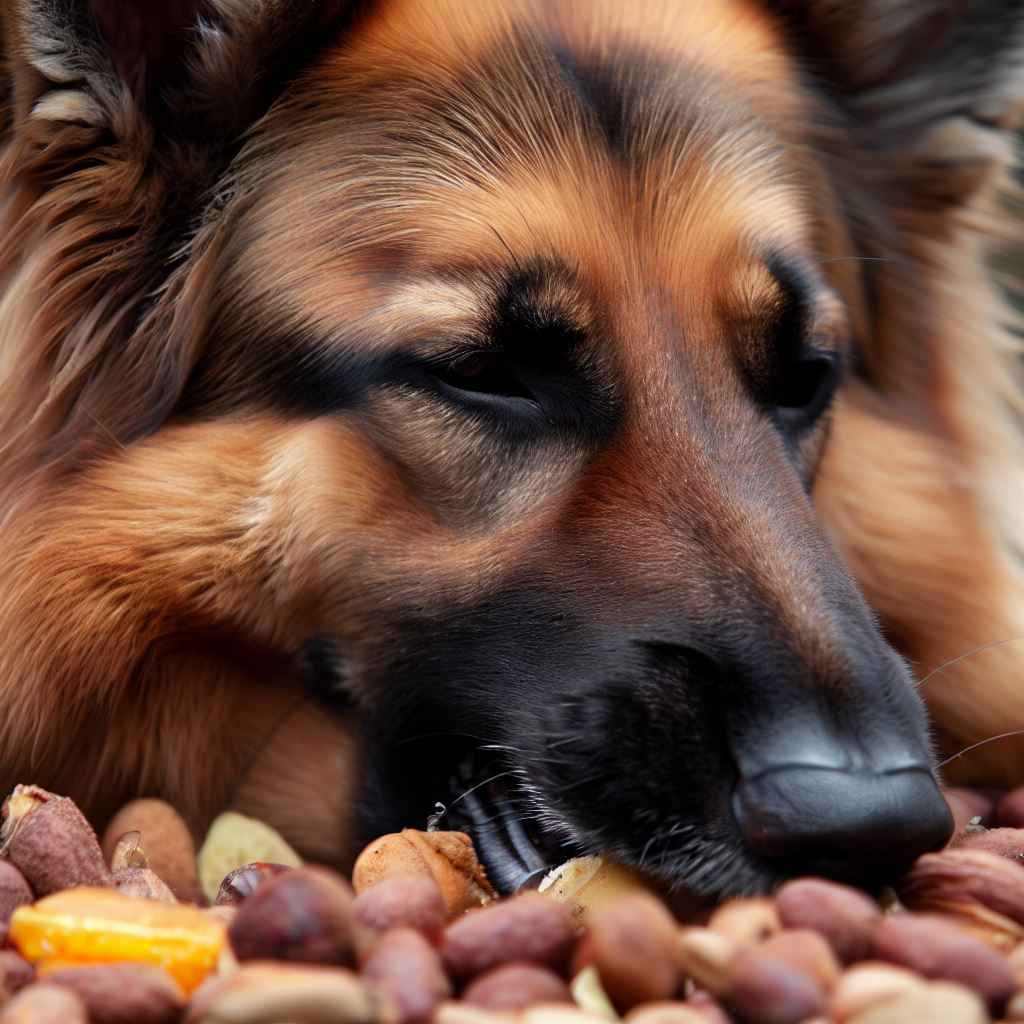What Kind Of Food Do German Shepherds Need?
What Do German Shepherds Eat? Food which contains the proteins and fat are the good source of food for german shepherd. As we know that they are famous for their high energy powers so, we should feed them food that maintains their energy level high such as lamb, chicken, beef, salmon etc.
German Shepherds requires a balanced diet to stay healthy and energetic. Their primary food source should be high quality commercial dog food. Look for brands that list meat as the first ingredient by avoiding fillers like corn or soy. Consider age specific formulas for puppies, adults or seniors. Protein is essential for muscle development, so aim for foods with at least 18 to 22% protein content. Fat content should range from 5 to 8% for proper energy levels. Fiber helps digestion, so choose foods with around 3-5% fiber. Freshwater should always be available, as dogs need to stay hydrated.
You can also incorporate small amounts of fresh vegetables and fruits into their diet as snacks, but avoid grapes, raisins, and onions which can be toxic. Feeding frequency of the German Shepherd depends on their age. Puppies usually eat three times in a day while adults can switch to two meals. You should also avoid overfeeding to prevent them from obesity. Consult your veterinarian for personalized dietary recommendations. Regular exercise and portion control are vital for maintaining a healthy weight and overall well being in German Shepherds.
Which Is The Best Food For German Shepherd?
Any good quality food is a complete dog food which contain at least 18.5 protein and 20% meat content. Avoid foods that use a high wheat content or you can also offers Large Breed Adult Chicken, Rice and Eagle Pack Power offers adult dog food etc.
The best food for a German Shepherd depends on various factors like their age, activity level and specific dietary needs. Generally, high-quality commercial dog food is a safe choice. Some owners opt for grain free or limited ingredient diets if their dog has allergies or sensitivities but consult your veterinarian before making this choice. Consider breed with specific formulas tailored to German Shepherds which can cater to their unique nutritional needs.
You can also feed them a mix of dry kibble and wet canned food for variety and added moisture. Homemade diets are an option but require careful planning to ensure they meet all nutritional requirements. Always consult with a vet or canine nutritionist when creating homemade meals.
The best food for your German Shepherd is one that keeps them healthy, maintains a proper weight and suits their individual needs.
How Much Should A German Shepherd Eat?
In a day the German Shepherd can eat about 1/3 bowl of dry fruits which are of about 5kg but if we talk about their puppies then this amount will be double or triple because their puppies needs more proteins and fats for their fast growing procedure.
The amount of food a German Shepherd should eat depends on several factors including their age, size, activity level and the type of food being fed. As a general guideline, adult German Shepherds typically require between 1200 to 1800 calories per day but this can vary also. For puppies, you should follow the feeding recommendations on the dog food label as they have different nutritional needs during growth. They may need 3 to 4 meals a day gradually transitioning to two meals as they grow.
Monitor your dog’s weight adjust their food intake accordingly. German Shepherds are prone to obesity, so it is important to avoid overfeeding. Split their daily portion into two meals to prevent overeating and potential stomach issues. The activity level and metabolism can also influence portion size that highly active dogs may require more calories while less active ones may need fewer. Consult your veterinarian for personalized feeding recommendations, regularly check your dog’s condition and adjust their diet to maintain a healthy weight.
Can German Shepherds Eat Human Food?
Yes German Shepherd can eat a range of human food for example they can consume the fried chicken, cooked fish, oat meals etc but very important is that you should maintain their meals in balance according their needs for diet.
They can eat human food but with guide and care to avoid from such unhealthy risk. While some human foods are safe and even beneficial for dogs but others can be harmful or toxic. Safe human foods for German Shepherds include lean meats like chicken or turkey (cooked and unseasoned), plain rice, plain pasta but most vegetables such as carrots, peas and green beans.
Moderation is recommended for feeding dogs fruits like apples and blueberries while avoiding toxic foods as chocolate, grapes, raisins, onions, garlic, avocado, salt or fat rich foods. Also avoid giving them bones especially cooked bones as they can splinter and cause choking or intestinal blockages. Always remove bones, seeds and pits from fruits make sure that the food is free from spices, sauces and seasonings as these can be harmful to dogs. Any human food given to your German Shepherd should only be an occasional treat and not use for a balanced dog food diet.
What Should You Feed A Years Old German Shepherd?
The ideal German Shepherd diet is to eat dry kibble dog food which includes the normal muscle meat as a main ingredient. Meat based meals are a safe and are high quality source of protein which making an ideal choice for dogs like Beef, Chicken and Fish.
Feeding a one year old German Shepherd requires the careful consideration of their nutritional needs. At this age they are transitioning from puppyhood to adulthood and their diet should reflect that change.
High-Quality Commercial Dog Food:
Opt for a trusted brand of commercial dog food that is specifically formulated for large breed puppies or young adults. Look for real meat as the primary ingredient with around 22 to 24% protein content.
Portion Control:
Be mindful of portion sizes to prevent overfeeding or underfeeding. Follow the feeding guidelines on the dog food packaging as a starting point but adjust based on your dog’s activity level and individual metabolism.
Balanced Diet:
Ensure a balanced diet by providing a mix of protein, carbohydrates and healthy fats. Avoid foods high in fillers and artificial additives.
Regular Feeding Schedule:
Establish a consistent feeding schedule with two meals a day. Avoid free feeding where food is left out all day.
Fresh Water:
Always provide access to fresh water as hydration is vital.
Treats and Supplements:
Limit treats and use them sparingly for training and rewards. Consult your veterinarian before adding any supplements to their diet.
Consult Your Vet:
Regular veterinary check ups will help monitor your German Shepherd’s growth and overall health. Your vet can provide specific dietary recommendations based on your dog’s individual needs.
Facts & Features Of German Shepherd:
- German Shepherds are renowned for their high intelligence and trainability.
- They excel in obedience training and are often used as working dogs in various roles in including police work and search and rescue.
- These dogs are known for their physical prowess.
- They have a strong, athletic build by making them well suited for various tasks from herding livestock to protection work.
- German Shepherds are loyal, protective and versatile dogs that can be trained to protect their owners.
- They are used in various roles to service dogs for disabled individuals, visual aid guides and therapy dogs for making them excellent watchdogs and versatile companions.
- They are a high energy breed that requires regular exercise and mental stimulation.
- Daily walks, playtime and training sessions are essential to keep them happy and healthy.
- German Shepherds have a double coat that consists of a dense, water resistant undercoat and a thicker outer coat.
- This coat requires regular grooming to prevent matting and reduce shedding.
- They are prone to certain health issues including hip dysplasia and degenerative myelopathy.
- Responsible breeding and regular veterinary cares are important for maintaining their health.




